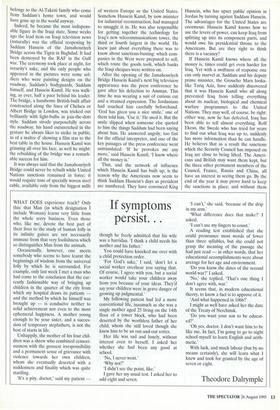If symptoms
persist. . .
WHAT DOES experience teach? Only this: that Man (in which designation I include Woman) learns very little from the whole sorry business. Even those who, like me, devote the best part of their lives to the study of human folly in its infinite guises are not necessarily immune from that very foolishness which so distinguishes Man from the animals.
Occasionally, however, one meets somebody who seems to have learnt the beginnings of wisdom from the universal folly by which he is surrounded. For example, only last week I met a man who had come to the conclusion that the cur- rently fashionable way of bringing up children in the quarter of the city from which my hospital draws its patients — and the method by which he himself was brought up — is conducive neither to solid achievement nor even to the most ephemeral happiness. A mother young enough to be your sister, and a succes- sion of temporary stepfathers, is not the best of starts in life.
Unhappily, the mother of his four chil- dren was a shrew who combined censori- ousness with the grossest irresponsibility and a permanent sense of grievance with violence towards her own children, whom she eventually deserted with a suddenness and finality which was quite startling.
'It's a pity, doctor,' said my patient — though he freely admitted that his wife was a harridan. 'I think a child needs his mother and his father.'
You could have knocked me over with a child protection order.
'For God's sake,' I said, 'don't let a social worker overhear you saying that. Of course, I agree with you, but a social worker would take your children away from you because of your ideas. They'd say your children were in grave danger of growing up judgmental.'
My following patient had led a more conventional life, inasmuch as she was a single mother aged 25 living on the 14th floor of a tower block, who had been deserted by the worthless father of her child, whom she still loved though she knew him to be an out-and-out rotter.
Her life was sad and lonely, without interest even to herself. I asked her whether she had been any good at school.
'No, I never went.'
'Why not?'
'I didn't see the point, like.'
I gave her my usual test. I asked her to add eight and seven. 'I can't,' she said, 'because of the drip in my arm.'
'What difference does that make?' I asked.
'I can't use my fingers to count.'
A reading test established that she could pronounce most words of fewer than three syllables, but she could not grasp the meaning of the passage she had just read — in other words, that her educational accomplishments were about average for her age and environment.
'Do you know the dates of the second world war?' I asked.
'No,' she replied. 'That's one thing I don't agree with, war.'
It seems that, in modern educational theory, to know a fact is to approve of it. 'And what happened in 1066?'
I might as well have asked her the date of the Treaty of Nerchinsk.
'Do you want your son to be educat- ed?'
'Oh yes, doctor. I don't want him to be like me. In fact, I'm going to go to night school myself to learn English and arith- metic.'
With luck, and much labour (but by no means certainly), she will learn what I knew and took for granted by the age of seven or eight.
Theodore Dalrymple


















































 Previous page
Previous page